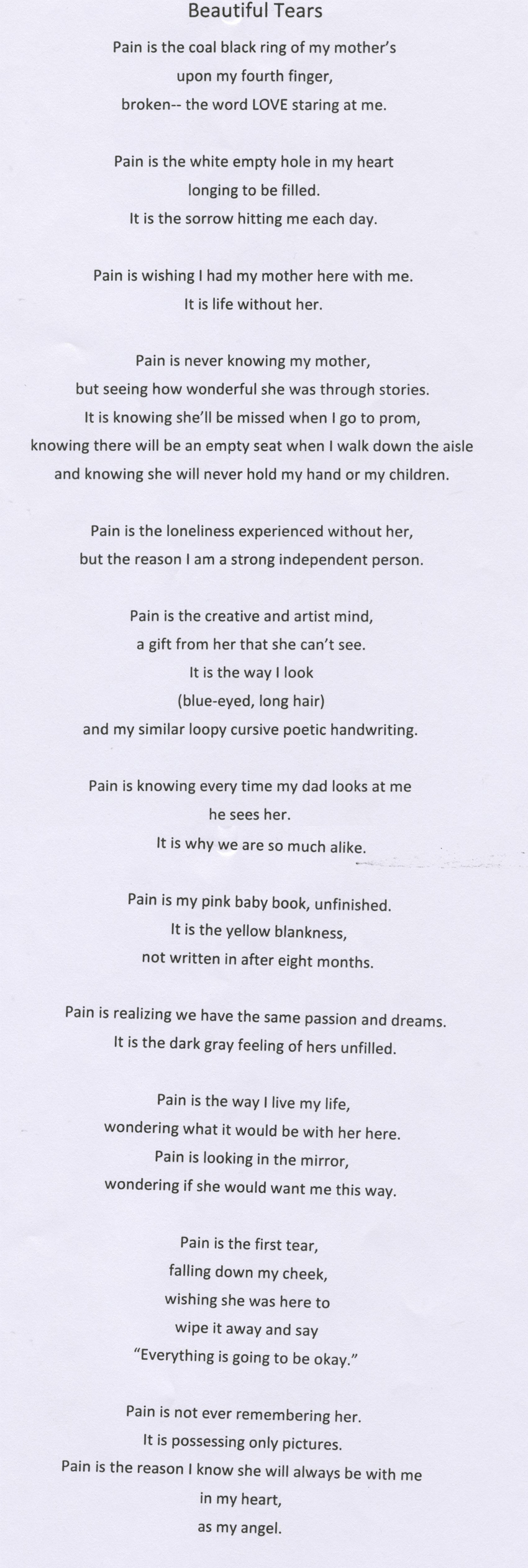2011
SARAH MOOK
POETRY PRIZE RESULTS
6-8 SECOND PLACE
Skye
Metzner
Hyndman,
PA
 |
|
COMMENTS FROM CONTEST JUDGE MARIE KANE: A note to all finalists: You are to be congratulated on your excellent entries to the 2011 Sarah Mook Poetry Contest. What trouble I had this year in deciding the winners! Because your work was advanced on all levels, my efforts took a longer time than usual to make the final decision. Know that your poems were read with care and attention to detail. I enjoyed every one of them! Sincerely, ------------------------------------------------------------------------------------------------ The title of this poem almost caused me to not want to read it; I was filled with images of crying over a break-up of some kind. Imagine my surprise when I quickly discovered that the poem is a loving elegy written for the speaker's mother. Using events from the speaker's life that will not be shared with her mother, the poem plots the daughter's pain. With its honest yet sorrowful tone, expressive images, and lack of self-pity, the poem embraces the difficult path a child must take without a parent. The opening tercet of the poem states without fanfare that: Pain
is the coal black ring of my mother's Note that the writer does not begin with a mournful statement concerning a mother's passing, but with a specific, a ring, left to her by her mother. The next section states that pain is "the while empty hole in my heart / longing to be filled. / It is the sorrow hitting me each day." With the use of the expressive "white empty hole" and the personification of sorrow "hitting" the speaker, this section's details concerning pain are vivid. When the poet states directly in the next section that the speaker wishes she "had my mother here with me" and that pain is "life without her," the reader fully understands the depth of suffering without the poem moving into mournful 'woe is me' self-pity. The next section of the poem delineates events that the speaker will have to experience without a mother. While the speaker can see her mother's spirit and "how wonderful she was through stories," the speaker also knows that "she'll be missed when I go to prom," knows that there will be "an empty seat when I walk down the aisle," and that "she will never hold" the hands "of my children." These are events that may be taken for granted by someone whose mother is alive, but are significant in this speaker's life. The speaker realizes many effects of her mother's death. While it brings "loneliness," it can also enable her daughter to be "strong" and "independent," with a "creative and artist [sic] mind, "gift(s) from her." The speaker's appearance, "(blue-eyed, long hair)" and "similar loopy . . . "poetic handwriting" are also gifts from her mother. I appreciate this realistic maturity. The speaker continues with even more painful realizations: Pain
is knowing every time my dad looks at me That her mother died with she was eight months old is given in a startling and sudden revelation - that after that time, her baby book is empty with its "yellow blankness." Also, knowing that when her father looks at his daughter, "he sees her" is similarly resonant. Finally, the speaker states what she has been aiming at through the whole poem: Pain
is the way I live my life, And at the end of the poem, this mother's daughter reveals that "Pain is not ever remembering her. / It is possessing only pictures." Now the reader realizes that the loss is not only the events in a life that will never be shared, it is the lack of memory of one's mother that is perhaps the most devastating effect of all. This
poem garners second place with its honesty, far-reaching self-knowledge,
and understated, yet emotional, images of loss. It is a marvelous tribute
to a mother the speaker will never know, yet dearly keeps alive in her
heart. Thank you for the privilege of reading your work. Marie
Kane |